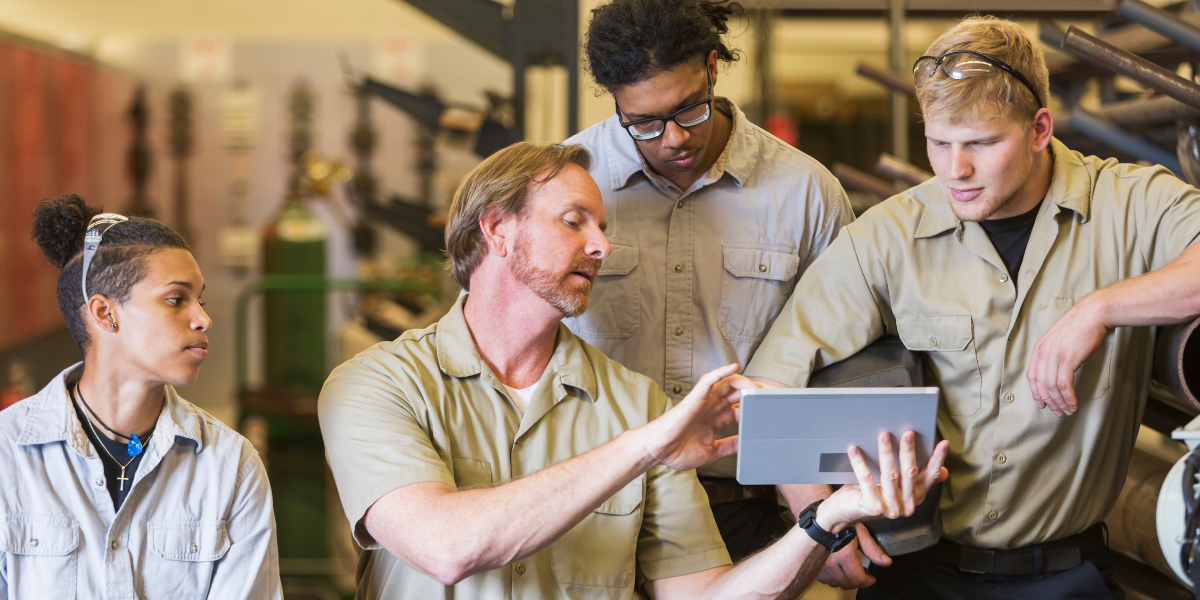Here are four practical ways Oklahoma and Texas auto body shops are teaming up with local vocational schools, offering flexible schedules, providing mentorship and focusing on hands-on learning to help shops build a strong, skilled workforce for the future.
As the collision repair industry faces an aging workforce, recruiting the next generation of skilled technicians is crucial for the longevity of auto body shops.
Shop owners like Brian Davis of Davis Paint & Collision Auto Centers in Oklahoma City, OK, and Body Shop Manager Joey Walker of Huffines Chevrolet Plano Collision Center in Plano, TX, are paving the way by embracing apprenticeships and creating opportunities for students to enter the field. Both Davis and Walker have decades of experience and recognize that nurturing talent early on ensures a steady pipeline of skilled workers.
 Brian Davis.
Brian Davis.
Here are four practical ways to hire apprentices and work around student schedules, helping auto body shops build a sustainable future workforce.
Collaborate with Vocational Schools
One of the most effective ways to recruit apprentices is by building strong relationships with local vocational or technical schools. With more than 30 years in the industry, Davis has made this a cornerstone of his approach. He actively engages with schools by visiting classrooms, hosting lunch-and-learn sessions, and even judging at SkillsUSA competitions. These interactions allow shop owners to identify promising students early in their education.
Davis emphasized connecting with teachers to understand which students are committed and driven.
"The biggest advantage of working with vo-tech schools is that we get to vet the students while they are in school," Davis said.
He often starts students with entry-level work, such as detailing cars, and as they gain more experience, they transition into more complex roles. This process allows students to grow within the company, creating a strong sense of loyalty and job satisfaction.
Walker, who manages an auto body shop in Frisco, TX, shared a similar sentiment.
 Joey Walker.
Joey Walker.
"Everyone who works here has come well recommended from the school," Walker explained. By working closely with collision programs, he can identify students who are skilled and passionate about the industry.
Offer Flexible Scheduling
Flexibility is key when working with student apprentices. Many young adults balance their education with part-time jobs, so offering adaptable work schedules is essential.
Walker has embraced this by allowing students to work around their school commitments. He recalled a paint prepper who works in the shop three days a week, scheduling his hours around his classes.
"We need to be more flexible if we're going to be prepared with personnel," Walker said. This willingness to accommodate students' schedules allows them to gain valuable hands-on experience without sacrificing their education.
Davis has also mastered the art of flexible scheduling, often working with 17-, 18- and 19-year-old students who are still becoming young professionals. He typically pairs students with an experienced A tech, allowing them to learn while gradually increasing their responsibilities over two to three years. This approach benefits the student and ensures they are fully prepared to transition into full-time roles upon graduation.
Create Mentorship Opportunities
Mentorship is vital in helping students transition from the classroom to the shop floor. Both Davis and Walker stressed the importance of pairing young apprentices with experienced technicians.
Davis highlighted the need for mentorship, noting that many students still develop individually.
"You're not just turning out technicians; they could be a team lead, an estimator, a painter, a prepper -- there are many possibilities," he explained.
By pairing students with seasoned professionals, shop owners can ensure apprentices learn technical skills and develop soft skills, such as patience, communication and leadership. These mentorship opportunities foster a sense of belonging and commitment, leading to higher retention rates.
In Davis' shop, 40-45% of students stay on after their apprenticeships, and many return after brief absences because of the strong support system they experienced during their training.
Walker has witnessed similar benefits. He has seen multiple generations of technicians work side by side, including a body technician and his son. This family atmosphere extends beyond blood relations, as Walker treats every apprentice as part of his shop's "family." This inclusive environment helps retain young talent and builds a strong team culture.
Invest in Hands-On Learning
Davis and Walker agree that hands-on experience is critical to developing skilled technicians. While classroom education is important, practical application in a real-world setting is where students truly hone their abilities.
Davis works closely with instructors to ensure students are gaining the right skills. "I tell the instructors, don't focus so much on welding -- focus on disassembling a car," he said, emphasizing the need for practical, hands-on tasks.
Davis' shop also organizes field trips to give students a sense of what working in a shop is really like. These trips help bridge the gap between theory and practice, allowing students to become comfortable with the shop environment before they start their apprenticeships.
Walker has seen firsthand how hands-on learning benefits students, especially during busy seasons like after the Texas State Fair, when his shop experiences a surge in business. He ensures students get ample opportunity to engage in meaningful work, helping them grow their skills and confidence in real-world scenarios.
Involving students and apprentices in your auto body shop is not just about filling immediate vacancies -- it's about building a sustainable workforce that will keep your business thriving for years.
By collaborating with vocational schools, offering flexible scheduling, creating mentorship opportunities and investing in hands-on learning, shop owners can cultivate a new generation of skilled technicians passionate about the industry.
As Davis put it, "We are breeding our own by hiring students and apprentices," ensuring the next generation is prepared to take the reins in the collision repair industry.














Leona Scott